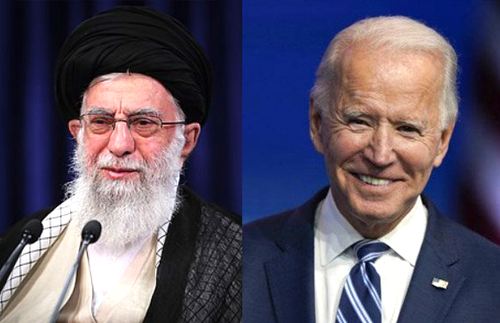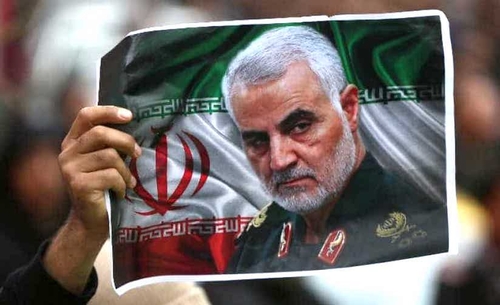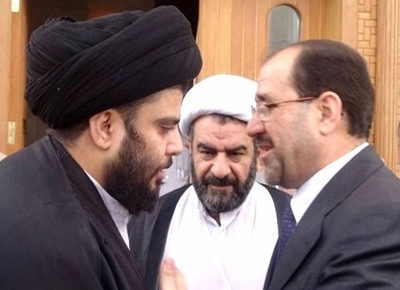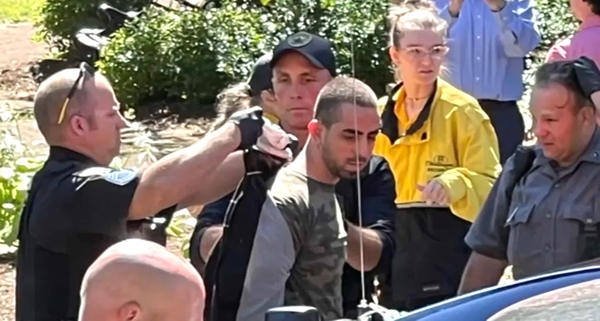Global Review: The European Union claims that negotiations with Iran have hammered out a document concerning its nuclear activities acceptable to both Washington and Tehran. Will a new JCPOA be signed?
Daniel Pipes: It is nearly impossible to gauge this from the outside. On the one hand, Joe Biden desperately wants a deal; on the other hand, Iran's Supreme Leader Khamene'i has grave doubts about it. Will the former keep making concessions that finally convince the latter to proceed? Or does Biden have a red line beyond which he will not go? If you press me for an answer, I am inclined to say Biden has no red line and an agreement will be signed.
 Khamene'i (83) and Biden (79): smiling in anticipation of a deal? |
GR: If the Islamic Republic of Iran's efforts to build a nuclear bomb reach the point of no return, how should the U.S. and Israeli governments respond?
DP: I am hoping that the Israelis, who have extraordinary sources of information on the Iranian nuclear program, will not let things reach that point. I am not ready to make plans for Iranian nukes.
GR: The Islamic Revolutionary Guard Corps now openly threatens New York City. Does this imply that the mullahs have global goals?
DP: Yes, but that is nothing new. From its origins in Ayatollah Khomeini's imagination, the Islamic Revolution aspired to be a global movement. Threatening a distant city with nuclear destruction, however, is alarmingly novel and dangerous.
GR: Did the 2020 assassination of Qasem Soleimani, head of the Quds Force, affect Iranian capabilities or ambitions?
DP: Many analysts predicted at the time of his death that his absence would severely impair Iranian foreign initiatives. I disagreed, seeing him as just a capable bureaucrat within a large system. The 2½ years since his death suggest I was correct, for Iranian aggression continues undiminished.
 Qasem Soleimani celebrated. |
GR: What are the Russian and Chinese strategic goals vis-à-vis Iran?
DP: Both see Iran as a useful ally against the West, but Beijing more so than Moscow. Xi needs its energy resources and wants it to serve as a major entry point for the Chinese Communist Party in the Middle East; Putin sees Iran as a rival in both the energy sphere and in Syria.
GR: Might Russia or China stretch their nuclear umbrella to protect Iran from Israel?
DP: I cannot imagine that, for neither regime wishes closely to tie itself to the mullahs in Tehran.
GR: Pro- and anti-Iranian forces in Iraq, led respectively by Nouri al-Maliki and Muqtada al-Sadr, are engaged in a fierce struggle for power. What does this signify and where is it leading?
DP: One specialist on Iraqi public opinion, Munqith Dagher, holds that the conflict is both personal and ideological. Maliki represents "a globally-oriented Shia Islamist doctrine" and Sadr forwards "a nationally-focused Iraqi Shia political Islamist doctrine." The former echoes Iran's Khomeinist line of seeking world revolution; the latter "focuses on spreading Islamic principles in the state and working within the national political process without an end goal of establishing a greater Islamic state." The national approach appears to be more popular than the transnational one. That is relatively good news.
 Muqtada al-Sadr (L) and Nouri al-Maliki (R) face off. |
GR: How important was Egyptian mediation in ending the recent clash between Israel and Palestinian Islamic Jihad (PIJ)? How important was it in keeping Hamas out of that conflict?
DP: The Egyptian government played a positive role in this Gaza-Israel confrontation, as it has done in previous ones. In addition to the prestige of serving as peacemaker, it benefits by cooling down the Islamist war on Israel, something detrimental to its own interests because it riles up Egyptian Islamists. But I doubt Cairo had much of a role in keeping Hamas out of the fighting; Hamas decided this for its own reasons.
GR: Can PIJ outgrow its current limitations as an Iranian-funded jihadi group to become a mass movement and challenge Hamas for control of Gaza?
DP: I doubt that PIJ leaders or their Iranian patrons aspire to such a role. Both seem content to leave the burdens of governance to Hamas and to focus purely on jihad against Israel.
GR: Mahmoud Abbas, the Palestinian Authority leader, is aging and ineffectual; can Hamas or rivals within the PLO overthrow him?
DP: Yes, that strikes me as a real possibility, especially if Israel's security establishment abandons him. For, despite Abbas' support for the murder of Jews, it does find him acceptable and supports his continued rule.
GR: Is Hadi Matar, the would-be assassin of Salman Rushdie, a lone wolf or an agent of Iran?
DP: The evidence so far suggests that he was inspired by Iranian ideology and had contact with its institutions but planned out the Chautauqua operation on his own. More information, however, might change this picture.
 Hadi Matar: lone wolf or Iranian agent? |
GR: Has the assault on Rushdie encouraged more such assassination attempts?
I count 22 Islamist assassinations or assassination attempts in the West since 1980. This is a rarified form of violence with only a handful of potential targets, with Geert Wilders probably the most prominent. Therefore, the attack on Rushdie will not likely have direct operational consequences. More important than this will be its political consequences, for example, affecting attitudes towards the pending nuclear deal.
